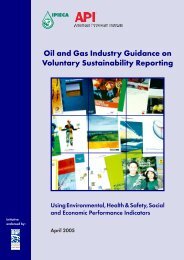Why gender matters - Centre for Social Responsibility in Mining ...
Why gender matters - Centre for Social Responsibility in Mining ...
Why gender matters - Centre for Social Responsibility in Mining ...
You also want an ePaper? Increase the reach of your titles
YUMPU automatically turns print PDFs into web optimized ePapers that Google loves.
Background reader<br />
84<br />
their new role as <strong>in</strong>come earner.<br />
In the m<strong>in</strong><strong>in</strong>g workplace, women<br />
cont<strong>in</strong>ue to face issues of sexual<br />
harassment and abuse, salary<br />
<strong>in</strong>equity and discrim<strong>in</strong>ation (Kemp<br />
and Pattenden 2007).<br />
M<strong>in</strong><strong>in</strong>g can also result <strong>in</strong> the<br />
<strong>in</strong>flux of migrant labour, usually<br />
men, hop<strong>in</strong>g to secure m<strong>in</strong><strong>in</strong>g<br />
employment, either directly or <strong>in</strong><br />
related <strong>in</strong>dustries. Such migration<br />
can change the dynamics of<br />
communities – <strong>in</strong> both the send<strong>in</strong>g<br />
and receiv<strong>in</strong>g communities – and<br />
put women <strong>in</strong> a more vulnerable or<br />
marg<strong>in</strong>alised position.<br />
Indigenous employment<br />
Some of the workplace challenges<br />
may be compounded <strong>for</strong> Indigenous<br />
women, who may have additional<br />
cultural and familial responsibilities<br />
to non Indigenous women. They<br />
may also have negative experiences<br />
relat<strong>in</strong>g to the <strong>in</strong>tersect<strong>in</strong>g issues of<br />
<strong>gender</strong>, colonialism and racism.<br />
Little is known about the<br />
experiences of Indigenous<br />
women <strong>in</strong> m<strong>in</strong><strong>in</strong>g employment.<br />
Although there is a grow<strong>in</strong>g body<br />
of literature about the experiences<br />
of Indigenous women work<strong>in</strong>g <strong>in</strong><br />
small scale and artisanal m<strong>in</strong><strong>in</strong>g<br />
<strong>in</strong> develop<strong>in</strong>g countries (Lahiri-<br />
Dutt and Mac<strong>in</strong>tyre 2006), only a<br />
few sources detail the experiences<br />
of Indigenous women <strong>in</strong> large<br />
scale m<strong>in</strong>es. Research from Papua<br />
New Gu<strong>in</strong>ea’s Lihir Gold M<strong>in</strong>e<br />
(Mac<strong>in</strong>tyre 2006) has shown that<br />
while women’s experience work<strong>in</strong>g<br />
at the m<strong>in</strong>e was generally positive,<br />
their work rema<strong>in</strong>ed undervalued.<br />
In Australia, Indigenous women<br />
face additional employment<br />
challenges to non Indigenous<br />
women, such as systemic social<br />
disadvantage, complex family<br />
responsibilities and issues<br />
associated with hold<strong>in</strong>g positions<br />
of authority over other Indigenous<br />
people. They also face cultural<br />
pressure to stay at home and look<br />
after children and family members<br />
(Kemp and Pattenden 2007).<br />
Socio-economic and<br />
environmental aspects<br />
Economic<br />
M<strong>in</strong><strong>in</strong>g can deliver direct and<br />
<strong>in</strong>direct benefits to communities<br />
and catalyse economic<br />
opportunities <strong>for</strong> family units,<br />
whole communities and regions.<br />
Women and children can benefit<br />
from this <strong>in</strong>creased activity where<br />
additional <strong>in</strong>come is generated by<br />
the <strong>in</strong>volvement of men or women<br />
<strong>in</strong> direct employment or through<br />
local enterprise development and<br />
supply cha<strong>in</strong> l<strong>in</strong>kages.<br />
However, there is a considerable<br />
body of evidence to suggest that<br />
m<strong>in</strong><strong>in</strong>g can also <strong>in</strong>crease the level<br />
and extent of economic <strong>in</strong>equity<br />
through re-distributions of<br />
f<strong>in</strong>ancial resources (Gerritsen and<br />
Mac<strong>in</strong>tyre 1991). The sudden <strong>in</strong>flux<br />
of cash through compensation,<br />
royalties and wages through direct<br />
or <strong>in</strong>direct employment (usually<br />
of men) and associated economic<br />
activity can result <strong>in</strong> significant<br />
changes to community life, often<br />
with a more negative impact on<br />
women.<br />
For example, women and<br />
families can become dependent<br />
on f<strong>in</strong>ancial flows from m<strong>in</strong><strong>in</strong>g<br />
to susta<strong>in</strong> their livelihoods,<br />
stripp<strong>in</strong>g them of traditional<br />
means of acquir<strong>in</strong>g status and<br />
wealth (Macdonald 2006). Even<br />
if they are entrepreneurial, it is<br />
often more difficult <strong>for</strong> women<br />
than men to engage <strong>in</strong> economic<br />
benefits that might flow from the<br />
m<strong>in</strong>e. Generally speak<strong>in</strong>g, women<br />
entrepreneurs face difficulties that<br />
their male counterparts may not.<br />
For example, a Commonwealth<br />
Secretariat study (1999) found that<br />
female entrepreneurs cited major<br />
difficulties <strong>in</strong> obta<strong>in</strong><strong>in</strong>g credits<br />
and loans.<br />
Increased total family <strong>in</strong>come is<br />
not necessarily <strong>gender</strong> neutral and<br />
will not automatically translate <strong>in</strong>to<br />
improved family and community<br />
livelihood. In certa<strong>in</strong> contexts, men<br />
are known to spend m<strong>in</strong><strong>in</strong>g wages<br />
on short term consumables and<br />
status items that are associated<br />
more with prestige than family<br />
wellbe<strong>in</strong>g (Trigger 2003). Some<br />
also spend wages on prostitution,<br />
which <strong>in</strong> turn can expose<br />
themselves and other women<br />
with whom they engage with<br />
sexually to sexually transmitted<br />
diseases (Silitonga, Ruddick, and<br />
Wignall 2002). Evidence shows<br />
that when women tend to manage<br />
the household <strong>in</strong>come the benefit<br />
tends to flow through the whole<br />
family (Emberson-Ba<strong>in</strong> 1994).<br />
With men controll<strong>in</strong>g resources,<br />
redistributions of power can<br />
occur, often exacerbat<strong>in</strong>g exist<strong>in</strong>g<br />
unequal <strong>gender</strong> relations.



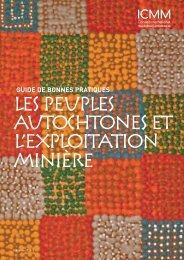
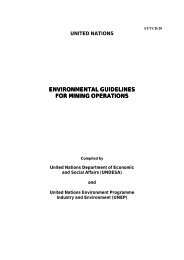
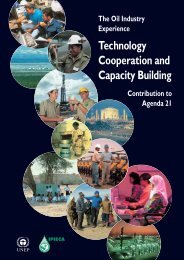
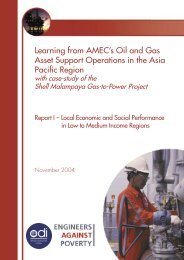
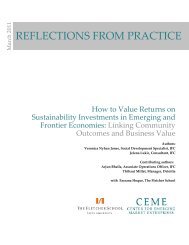
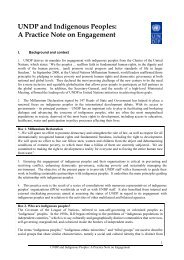
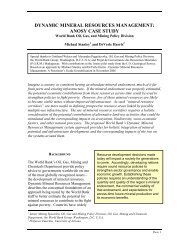
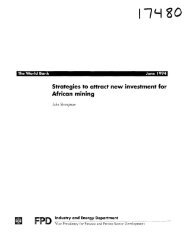
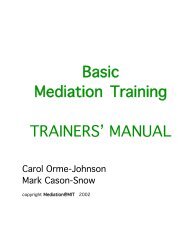
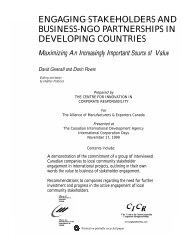
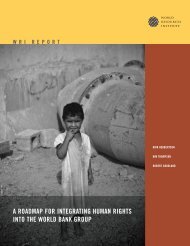
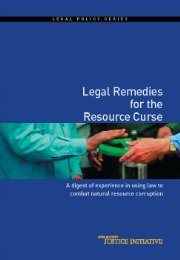
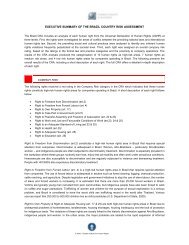
![[PDF] Community Development Toolkit - CommDev](https://img.yumpu.com/48616495/1/184x260/pdf-community-development-toolkit-commdev.jpg?quality=85)
